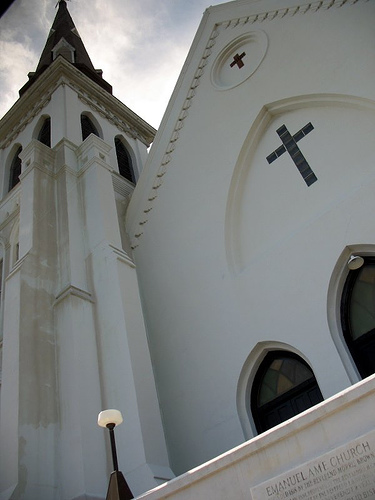

The shooting at Emanuel African Methodist Episcopal Church in Charleston is heavy on my heart because 10 years ago I, too, stepped into an AME church as a young white man. I didn’t know anyone there and was anxious about how I would be perceived. But the pastors and members showed me hospitality that forever changed my life.
I went on to become a member of the AME Church and learn from its rich heritage of faith in Jesus in the face of suffering and injustice. I joined the choir, attended prayer meetings and Bible study, and preached my first sermon. Every step of the way, the congregation fully welcomed me as a brother in Christ, and we became family. They celebrated our wedding, officiated by our AME pastor. They witnessed us dedicate our four children to God. They affirmed my calling to pastoral ministry. And after nine years of worshiping together, they sent us out to bless our community beyond the AME Church.
So I grieve for Rev. Clementa Pinkney and the other members of his congregation who were murdered after showing hospitality to an unknown young white man. And I lament that this tragedy is only the latest in a long history of racially motivated violence against African Americans.
How can we respond? Let me suggest, particularly for my fellow white Americans, that we need to do more than express empathy from a distance. The Bible tells us to “mourn with those who mourn” (Romans 12:15). We need to come alongside our African American brothers and sisters to lament, to listen, and to learn.
The university promotes both study abroad (for students) and sabbaticals (for faculty) as short-term learning experiences outside of our normal academic environment. Such experiences have the potential to broaden our horizons and deepen our learning. The same concept might apply to your church involvement. If you want to pursue ethnic reconciliation and justice, there is no substitute for immersing yourself as a learner in a cultural tradition outside your own for an extended time.
Perhaps your next step is committing to participation in a congregation of another race or ethnicity for 6-12 months. If you decide to take this step:
- Approach the experience with a humble, learning posture.
- Bring along someone else from your own culture – you need someone to debrief with.
- Ask your current congregation to “send” you so they can participate in your learning.
So consider showing up at an AME worship service or Bible study near you. Don’t worry about what you look like or what people will think of you. As a white friend who also joined the AME church put it, “love will meet you at the door.”
Robert Howe serves with InterVarsity’s Graduate & Faculty Ministries at Virginia Tech. His passion is developing leaders to grow multiethnic witnessing communities, a topic he is currently exploring through Fuller Theological Seminary’s Doctor of Missiology program. Robert and his wife have four children, age six and under.

Leave a Reply